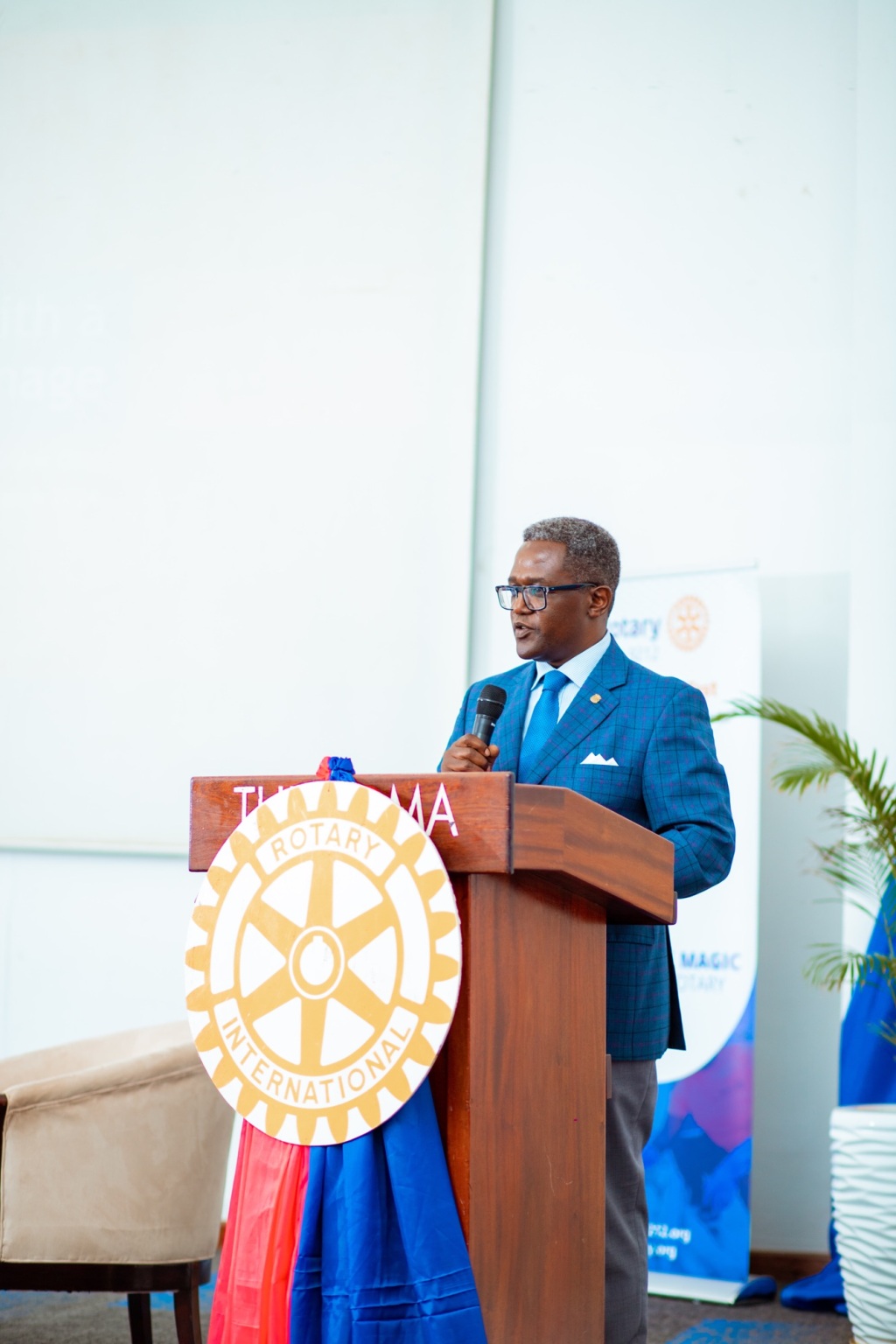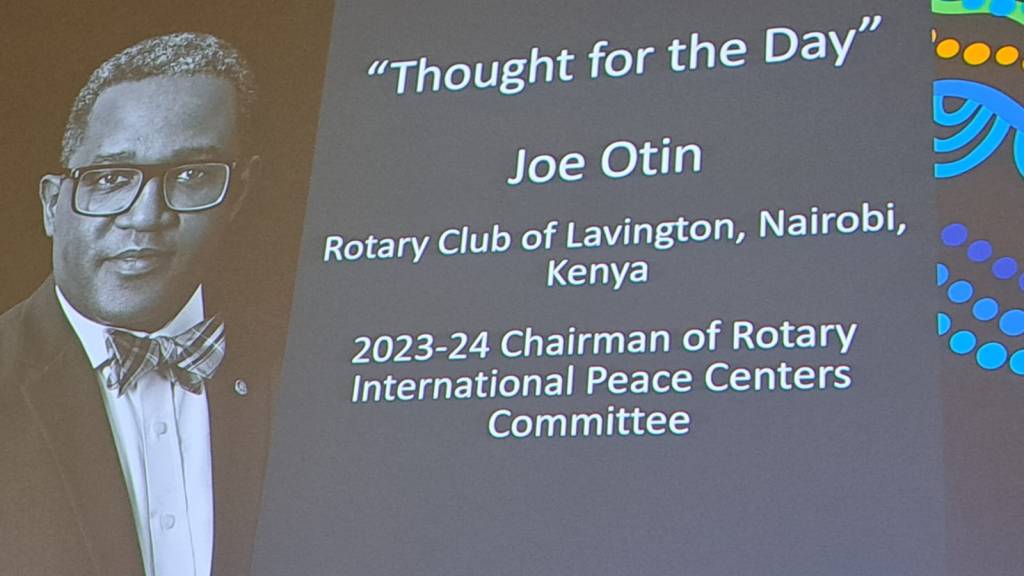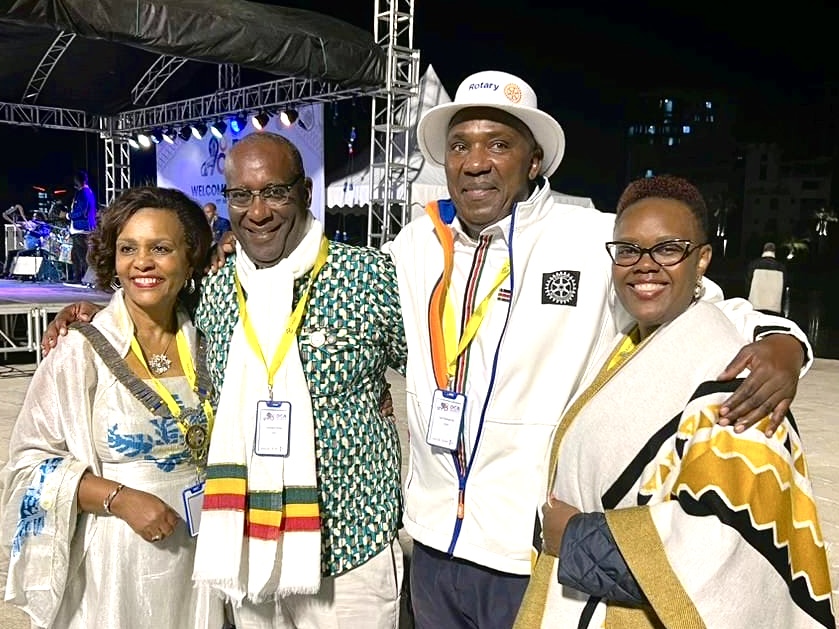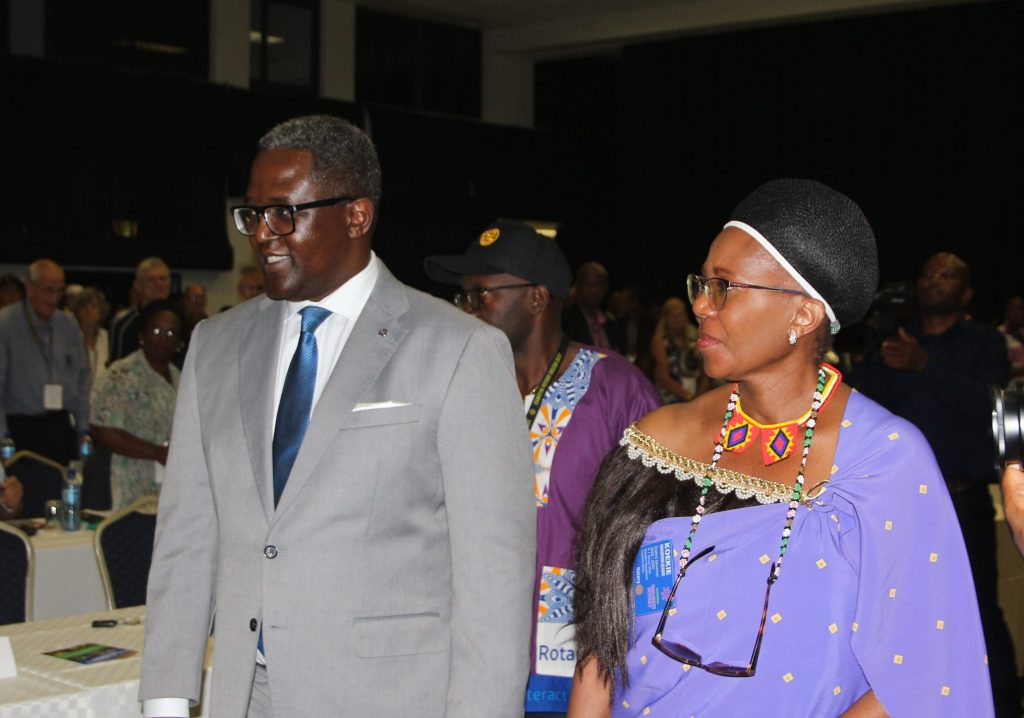DG Joe Otin’s Speech at the Installation of Lucy Munga as the President of the Rotary Club of Kitengela
12th July 2019
There is a quote from a book called Diplomacy penned by Henry Kissinger that highlights the long-standing suspicions held between the East and the West during the cold war. In it he says that “the Russians know no other word but action and they respect nothing else but force.”
Not only do these words allude to the ideological differences of the opposing sides but, in between the lines they also expose an uncanny admiration for the pragmatic approach employed by the Eastern power.
If we cast a net around dominant philosophical categories, we would find the said opposing sides in the same camp, clearly influenced by Western Philosophy that dominates European life. Eastern Philosophy on the other hand defines the mentality of the civilizations in the Far East.
A number of years ago I got a special kind of experience that exposed me to both Eastern and Western Philosophy all at once, which broadened my mind incredibly. I was appointed to facilitate training to a mixed language group at an international training seminar convened by Rotary International for members of its leadership team. I had obviously drawn the short straw in this case because I got a mix of Japanese and English speakers. All the English speakers in the group originated from Central Europe and did not speak the language as a native tongue.
It gave me the rare opportunity to observe the behavior of the teams that were separated into two based on language, and to glean the variations in their work ethic and problem solving. Once we had tackled the first problem, which was understanding how to use the clumsy translation equipment, fidgeting with receivers to find the right channels, disentangling from the web of cables and knowing which buttons not to press, we were good to go.
But not entirely. I knew that the interpreters sitting in a booth at the back of the room were speaking English, but for the life of me, I could hardly understand a word they said because the Japanese accent they came with was laid on very thick. It’s funny because at the end of the session when I went into their booth to complain they told me that they too couldn’t understand a word I was saying because of my accent. I angrily thought to myself that if they could not understand the Queen’s English they had no business being interpreters.
That notwithstanding, we did make headway and when we dished out the assignments, the groups dived into their work with admirable aplomb. In the Westerners group the natural leaders emerged and took charge. About 3 of them did most of the talking and debating, and the scattered input from the others was limited to affirming what had just been said or decided. When they got down to work, most of the action was carried out by these three leaders, while some others supported them sparingly, and another set encouraged them with positive verbal feedback.
With the Japanese speakers there was only one leader, and she was selected because of her apparent broad knowledge, practical experience and international exposure. Before the exercise began, she asked several pointed questions that were largely negative, starting with “The problem is….” I was irritated to high heaven by this and I fell short of blurting out, “Kindly present me with grand solutions, and not silly problems.”
But in hindsight, what she was doing was dissecting the assignment into distinct and discernable parts. While the Europeans took the question asked in the assignment as the definition of the problem, the Japanese chose to take the question separately, break it down and then define the problem for themselves. To me it felt like the process of extracting teeth but in reality, by the time she was done with The Great Inquisition, the solutions were clearly laid out for all to see.
It was like producing sausages; you really do not want to see them being made, but they taste very good when done. The solutions that the Japanese developed were superior, and they went a step further. Once the leader had a good idea of what they needed to address she carefully explained it to her team who listened intently, and then they went through the annoying question and answer ceremony which I’m sure was full of statements starting with “But the problem is…”
By this time the interpreters and I had fallen out. I didn’t bother to listen to them because I couldn’t understand their brand of English and they didn’t try to translate anything that the Japanese team were saying anymore, and so my powers of observation kicked into high gear. The leader carefully separated the activities into tiny little parts and then assigned each one to a member of the team and by the time she was through, everyone had something to do.
It was beautiful to watch. As they went through the process of delivering the outcomes they cut through the work like a yacht in the high seas on a clear day with the wind at its back. As a citizen of a country that was colonized as part of the Great British Empire, and brought up by parents that who had grown up in a traditional African setting and educated by Christian missionaries, this was the first time I had witnessed an exotic working style.
At that point the penny dropped, and the entire experience came to a head. There were lessons to learn from the Europeans and insights to gather from the Japanese. And the combination of the two points of view and approaches to problem solving could be valuable to any open-minded individual.
We can get the best from the East and West, as it were. The Rotary Club of Kitengela has an excellent strategic plan and based on its complexity it will take a tremendous amount of teamwork, dedication and leadership to see it through. Perhaps there is something that we can take form the two dominant philosophies that can help you along the road to the successful delivery of the vision.
To start with we can learn from the Japanese and involve every soul in the application of the strategic plan and the actions taken to deliver the outcomes. Clearly define the problem and break it down into smaller parts so that individuals can be responsible for certain details and accountable to the team. As the saying goes, “Many hands make light work.”
Secondly, the Eastern philosophy is based on the concept of integration with nature, and that each of us has a part in the greater scheme of things. The overall purpose of the world is more important than the singular parts and thus they subscribe to Karma. In order to fulfill your role you need to be at peace with the world and to do so you need to understand the course of the current that you are in.
Therefore, at the beginning of every task spend your time listening to the others around you and pay particular attention to your team members. They will have most of the answers that you seek.
Thirdly, the Western ideas are based on control and that the concept of intelligence gives you dominion over your environment, keeping your squarely in the directors’ chair. Within this point of view, constant communication with your team members is the key to keeping everyone on track. Utilize a variety of communication methods available to you to deliver your messages and inspire action from team members.
Forth on the list is the process of building the confidence in others through positive behavior reinforcement, also known as cheerleading. In the East they may think that carrying people along for the feel-good factor is a waste of space, but the Americans have taken it to a higher level because cheerleading is a paid position. However the celebration of success and the recognition of exemplars in your team is the fuel that drives volunteers towards greater achievements. Steven Covey recommends that you should “Be hearty with your approbation and lavish with your praise.”
All said and done, encouraging the right kind of habits is necessary in order to drive change and develop the positive behavior that will establishes a legacy.
Finally, perhaps we can learn from our own African philosophy which has been passed down though oral history and captured in Sessional Paper Number 10 of 1965. In it we define our style as African Socialism in an attempt to amalgamate best practice from around the world, selecting those that apply naturally to us. From it we find the means to adapt, and to adopt the necessary working style that will apply to the variety of cultures within your team, and externally among the donor community.
You have a comprehensive and inspiring strategic plan, similar to Sessional Paper number 10 of 1965. But don’t let your plan end up like the sessional paper which fell short in its implementation with the outcomes being only a shadow of what it could have been, regret and disappointment in tow. No, track your goals day by day, week by week, month by month and project by project.
And remember what Confucius says, “When it is obvious that the goals cannot be reached, don’t adjust the goals, adjust the action steps.”
President Lucy Munga, may God bless the vision on your mind, the love in your heart and the work of your hands, and may He bestow you, your family and your club members with good fortune, sound health and abundant love.





Leave a comment